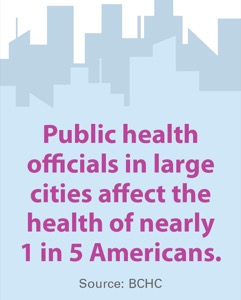The number of epidemiologists in large health departments need to nearly double to respond quickly to public health threats, according to a recent report by The Big Cities Health Coalition (BCHC) and the Council of State and Territorial Epidemiologists (CSTE).
“The shortfall puts the nation’s efforts to combat future and current pandemics at risk,” Chrissie Juliano, MPP, executive director of the BCHC, said at a media briefing releasing the report.
To reach full capacity, departments reported the need to increase their epidemiology staffs by 47% “to promote and protect the health and safety of the nearly 62 million people they serve,” Ms. Juliano said. “Together these public health officials directly affect the health and well-being of nearly one in five Americans. BCHC sees the findings of this report as vital to the health of folks who live in these cities.”
Only 1,284 epidemiologists worked in the 26 participating BCHC departments during the survey from January to May 2021. More than 175 positions went vacant in 2021—more than double the open positions four years earlier, the report found.
The need to increase the number of epidemiologists in local health departments became dire during the COVID-19 pandemic, according to Mysheika Roberts, MD, MPH, Columbus, Ohio, health commissioner and BCHC chair, and Janet Hamilton, MPH, CSTE, the executive director.
Dr. Roberts said in response to a question from Infectious Disease News Special Edition that calls to the Columbus Health Department epidemiologists about infectious diseases went from about 40 a day before the outbreak to more than 1,000 daily at the height of the COVID-19 pandemic.
“So even if you were fully staffed, you don’t have the bandwidth to expand to that volume that quickly,” Dr. Roberts said. “That’s 1,000 individuals [a day] we have to interview. Then we have to get that information in the database and then that information has to be crunched. There’s no way you can keep up with that.”
The report clearly demonstrates the need, not only for epidemiologists but more funding in general. "Federal resources to fight COVID-19 are not reaching health departments on the front lines where they are needed most," Dr. Roberts said.
The past two years have taken a tremendous toll on public health departments, they said. Emergency COVID-19 funding will soon disappear, “presenting yet another ‘funding cliff’ for public health,” Dr. Roberts said. “Cities need direct, sustained funding to make our nation prepared for the next pandemic and to fight ongoing health crises like gun violence and the opioid epidemic.”

The participants said health departments shifted many of their epidemiologists to manage the pandemic, leaving numerous other critical areas less than adequately covered. “Almost half of BCHC epis are working on COVID,” Ms. Juliano said, with another 27% focusing on infectious diseases and 8% working as generalists.
Local health officials are making tough decisions, not only diverting key staff from challenges like gun violence and overdoses, but also from obesity, tobacco use, sexually transmitted diseases, as well as maternal and child health and infant mortality.
“These disease detectives collect, analyze and deliver timely outbreak data to inform both policymakers and the public where outbreaks are happening and how they can be stopped,” Ms. Hamilton said. “This study makes clear what we knew anecdotally: Big cities need more staff and resources to address the magnitude of the public health concerns in their jurisdictions.”
The sources reported no relevant financial disclosures.
This article is from the June 2022 print issue.


